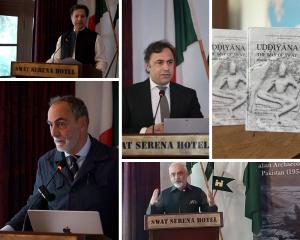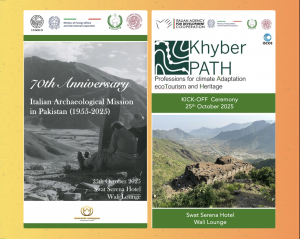Italian Archaeological Mission Marks 70 Years of Collaboration in Pakistan

Left Up: Hon. Justice Miangul Hassan Aurangzeb; Left Down: Prof. Luca Maria Olivieri; Middle: Dr. Abdul Samad; Right Down: Dr. Aftab Rana; Right: Commemorative publication.
The celebration was sponsored by WAKSAW, ISMEO, and Ca’ Foscari University of Venice
WAKSAW is honored to co-sponsor the 70th anniversary celebration of the Italian Archaeological Mission in Pakistan, highlighting our shared commitment to cultural heritage.”
NEW YORK, NY, UNITED STATES, November 11, 2025 /EINPresswire.com/ -- On 25 October, the city of Saidu Sharif in Swat, Pakistan, hosted the 70th anniversary celebration of the Italian Archaeological Mission in Pakistan, which is now jointly managed by ISMEO (the International Association for Mediterranean and Oriental Studies) and Ca’ Foscari University of Venice.— Yali Xuan
The archaeological activities of the Italian Mission in Swat date back to 1955, when Giuseppe Tucci, the renowned Tibetologist and orientalist, visited the region for the first time. That visit marked the beginning of a remarkable and uninterrupted archaeological activity by the Mission that has continued for seven decades, shaping the study and preservation of Pakistan’s archaeological heritage. Under Tucci’s leadership, the Mission — then part of the former IsMEO, now ISMEO — soon became a pioneering force in Gandharan archaeology and a symbol of scientific cooperation between the two countries.
Highlights of the Anniversary Celebration
The anniversary ceremony began with a message from the Italian Ambassador to Pakistan, Marilina Armellin, who highlighted the Mission’s contributions to enhancing Pakistan’s global cultural visibility and strengthening the historic partnership between Italy and Pakistan. Her remarks set the tone for a series of speeches by Pakistani and Italian representatives, all of whom reaffirmed their longstanding support for the Mission’s work.
Among them, Dr. Abdul Samad, Director of the Directorate General of Archaeology and Museums (DGOAM) of Khyber Pakhtunkhwa Province and Secretary for Tourism, Culture and Archaeology, spoke about the fruitful and enduring collaboration between the Directorate and the Italian team. Messages followed from ISMEO President, Prof. Adriano Valerio Rossi, and from Ca’ Foscari University’s Rector, Prof. Tiziana Lippiello. A particularly meaningful moment came with the address of Hon. Hassan Aurangzeb, member of the Miangul royal family, under whose patronage Tucci and the first Director of the Mission, Domenico Faccenna, began their research in Swat. He recalled the foundation of the Swat Museum in 1959 by the Wali and Tucci, today one of the region’s most prominent cultural landmarks, housing the largest collection of Gandharan artefacts unearthed during archaeological investigations.
The senior bureaucrat, Government of KP Arshad Khan, followed. He shared his memories of the start of the excavations in Barikot, which his family, originally from Barikot, facilitated from the beginning of the project in the 1980s. The first session concluded with a greeting from Dr. Francesco Zatta, Head of the Islamabad headquarters of the Italian Agency for Development Cooperation, who reaffirmed Italy’s ongoing commitment to heritage protection and capacity building in Pakistan.
Collaboration and New Initiatives
The second part of the event highlighted the Mission’s enduring collaboration with Pakistani universities and cultural institutions. Speakers emphasized its pivotal role in training new generations of archaeologists through fieldwork and seminars, as well as its lasting impact on sustainable tourism in Khyber Pakhtunkhwa.
Academic leaders — including Dr. Razia Sultana (Mardan Women University), representatives from Swat University and Jahanzeb College, Aftab-ur-Rehman Rana (Sustainable Tourism Foundation), Prof. Rafiullah Khan (Quaid-i-Azam University), and Prof. Stefan Baums (University of Munich) — praised the Mission’s efforts to combine research, conservation, and community engagement. They noted how past initiatives, such as the ACT Project (2011–2017), had helped promote eco-tourism and heritage-based livelihoods across the region.
The ceremony concluded with the launch of Khyber PATH (Professions for Climate Adaptation, ecoTourism and Heritage) — a new three-year initiative led by Ca’ Foscari University of Venice in partnership with the Directorate General of Archaeology and Museums (DGOAM) and locally implemented by ISCOS INGO. Funded by the Italian Agency for Development Cooperation (AICS) with €3 million, the project will establish a 125-kilometre heritage trail linking eight major archaeological sites from Taxila to Barikot, integrating conservation, research, and tourism.
Director Prof. Luca Maria Olivieri also announced the discovery of a previously unknown Gandharan city at Zalamkot, along the ancient Hati-lar route, which was identified through a newly interpreted bilingual inscription (Sanskrit–Persian) as Jayapālanagara, named after the last king of the Hindu Shahi dynasty. Despite logistical challenges, this work continues thanks to the active involvement of local communities led by archaeologist and poet Abdul Nasir of Alladan-dheri.
WAKSAW’s Continued Commitment to Cultural Collaboration
As part of its enduring partnership with the Mission, WAKSAW Archaeological Alliance proudly sponsored both the 70th anniversary celebration and the publication of the commemorative volume Uḍḍiyāna: The Way of Swāt — honoring seventy years of archaeological friendship between Pakistan and Italy and the shared efforts to document, protect, and celebrate the heritage of the Swat Valley.
Read it here: https://www.waksaw.org/
Developed under WAKSAW’s auspices, this publication highlights the enduring collaboration between local communities and international scholars, standing as a key component of the collective achievements marking the Mission’s 70th anniversary. The initiative reflects WAKSAW’s broader mission to advance cross-cultural dialogue and academic exchange on a global scale.
"WAKSAW is honored to co-sponsor the 70th anniversary celebration of the Italian Archaeological Mission in Pakistan, highlighting our shared commitment to cultural heritage. This milestone reflects our ongoing commitment to preserving shared heritage and fostering global dialogue through archaeology and education,” said Yali Xuan, Founder and President of WAKSAW Archaeological Alliance
A Legacy of Collaboration and Resilience
Seventy years after its foundation, the Italian Archaeological Mission in Pakistan continues to stand as a model of scientific excellence — with many more than 1,000 publications — and a point of reference also for cultural cooperation and sustainable development in the region and for the training of local professionals in the field of archaeology, the protection and enhancement of cultural heritage. The breadth of participation in the anniversary celebration reflected this impact: university professors, provincial and federal authorities, female and male students, local cultural associations, representatives of publishing houses, architects involved in heritage projects, journalists, and members of the local communities from the sites where the Mission operates all gathered to honour this shared journey.
In a country that, like Italy, guards an immense cultural heritage yet has faced dramatic challenges — from the 2005 earthquake and the 2007–2009 Taliban incursion to the devastating floods of 2010 and 2022, and other climate-related crises — the joint efforts of Italy and the government of Khyber Pakhtunkhwa, together with the strong involvement of local communities, stand as a powerful example of how heritage preservation can foster resilience and sustainable growth.
As Ambassador Armellin remarked, this long-standing dedication and partnership is truly “a source of pride for Italy.”
About WAKSAW Archaeological Alliance
WAKSAW Archaeological Alliance is a non-profit organization dedicated to advancing international collaboration in archaeology, heritage conservation, and cultural education. WAKSAW works on a global scale to support research partnerships, publications, and community initiatives that preserve and promote our shared human heritage. Learn more at www.waksaw.org
Iris Wong
WAKSAW
info@waksaw.org
Legal Disclaimer:
EIN Presswire provides this news content "as is" without warranty of any kind. We do not accept any responsibility or liability for the accuracy, content, images, videos, licenses, completeness, legality, or reliability of the information contained in this article. If you have any complaints or copyright issues related to this article, kindly contact the author above.

